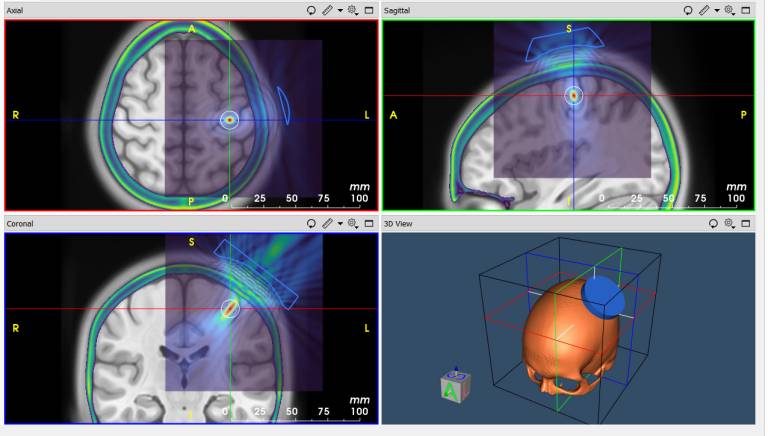UCL and Brainbox partnership advances technology for planning Transcranial Ultrasound Stimulation
14 December 2023

New treatments for depression, Parkinson’s and epilepsy could be made possible after the k-Plan software platform has become available for research teams around the world following partnership with Brainbox, a provider of non-invasive brain stimulation equipment.
Tailored for transcranial ultrasound stimulation (TUS) methodologies, k-Plan is an advanced modelling tool for planning TUS procedures. Its user-friendly interface uses a streamlined workflow, allowing users to effortlessly choose an ultrasound device, position it relative to template or medical images, and define precise sonication parameters.
TUS is a non-invasive technique that uses ultrasound waves to modulate brain activity through the skull. The hope is that researchers will be able to utilise k-Plan for treating conditions like depression, Parkinson’s disease, and epilepsy, and also for improving cognitive functions, having a life-changing effect.
Current TUS faces a key obstacle — variations in skull thickness and density cause distortion, scattering, and reduce the focus, intensity, and accuracy of ultrasound waves. This may decrease stimulation effectiveness and raise the risk of unintended effects. However, k-Plan’s technology uses simulations to model how ultrasound waves move through an individual’s skull and brain. Using imaging data like MRI or CT scans, a 3D model of the person’s head is created.

Simulations from k-Plan consider factors such as skull thickness, density, and various tissues, helping clinicians predict and adjust for distortions, focus ultrasound energy precisely, and optimise wave intensity. This personalised planning minimises risks, maximises treatment effectiveness, and tailors interventions to an individual’s specific neuroanatomy, addressing challenges from the variability and complexity of the human skull.
The k-Plan software platform, developed by research teams at University College London (UCL) and Brno University of Technology under the leadership of Professor Bradley Treeby, UCL Medical Physics and Biomedical Engineering, was commercialised by UCL Business. This entrance into the research market, with the support of Brainbox, will allow k-Plan to have a global reach and grow with increased marketing support.
The development of k-Plan was supported by the UK Engineering and Physical Sciences Research Council (EPSRC), the UCL Wellcome / EPSRC Centre for Interventional and Surgical Sciences (WEISS), and the Ministry of Education, Youth and Sports of the Czech Republic through e-INFRA CZ.
Our collaboration with Brainbox marks an important milestone in the journey of k-Plan from a research concept to a tool that can be utilized globally. This partnership is a significant step towards translating our basic research into practical, real-world applications. We are hopeful that this will lead to more effective and precise non-invasive brain stimulation methods, ultimately benefiting researchers and patients alike. I am looking forward to the future advancements and insights that this collaboration will enable.
Professor Bradley Treeby, UCL Biomedical Ultrasound Group
Andrew Thomas, Managing Director, Brainbox: “At Brainbox, we are thrilled to partner with k-Plan, ushering in a new era of precision and reliability in Transcranial Ultrasound Stimulation research. The integration of k-Plan into our suite of neuroscience solutions represents a crucial step forward in overcoming the challenges posed by skull variability. By enabling researchers to accurately plan and execute TUS procedures, k-Plan not only enhances the efficacy of current research but also paves the way for its future clinical applications in treating neurological conditions. This partnership signifies our commitment to providing cutting-edge tools that are vital in unlocking the full potential of non-invasive brain stimulation techniques, making a significant impact on both neuroscience research and patient care.”
Dr Weng Sie Wong, Senior Business Manager, UCLB: “I am absolutely delighted that researchers around the world will now be able to access the k-Plan platform to enable acceleration of their ground-breaking research into non-invasive TUS. Very much looking forward to further developments in this space in the coming years.”
Links
- Research profile of Professor Brad Treeby
- UCL Biomedical Ultrasound Group
- Brainbox
- k-Plan
- Wellcome / EPSRC Centre for Interventional and Surgical Sciences (WEISS)
- UCL Business
 Close
Close

